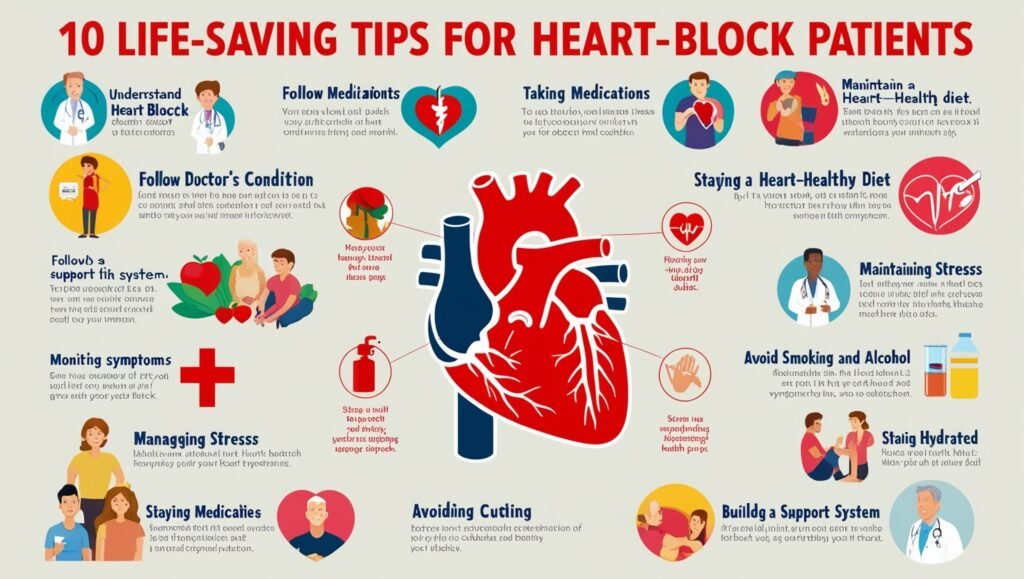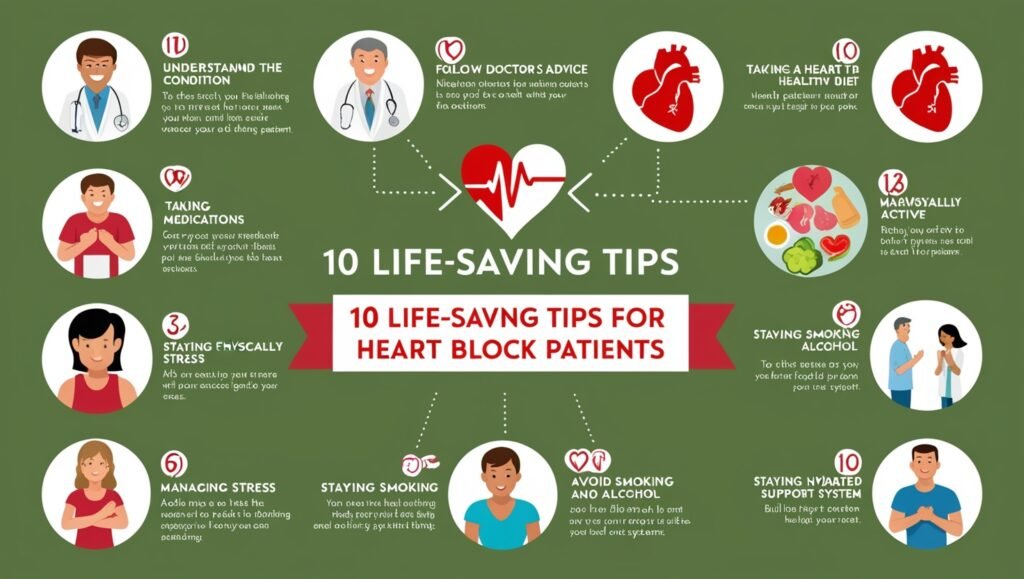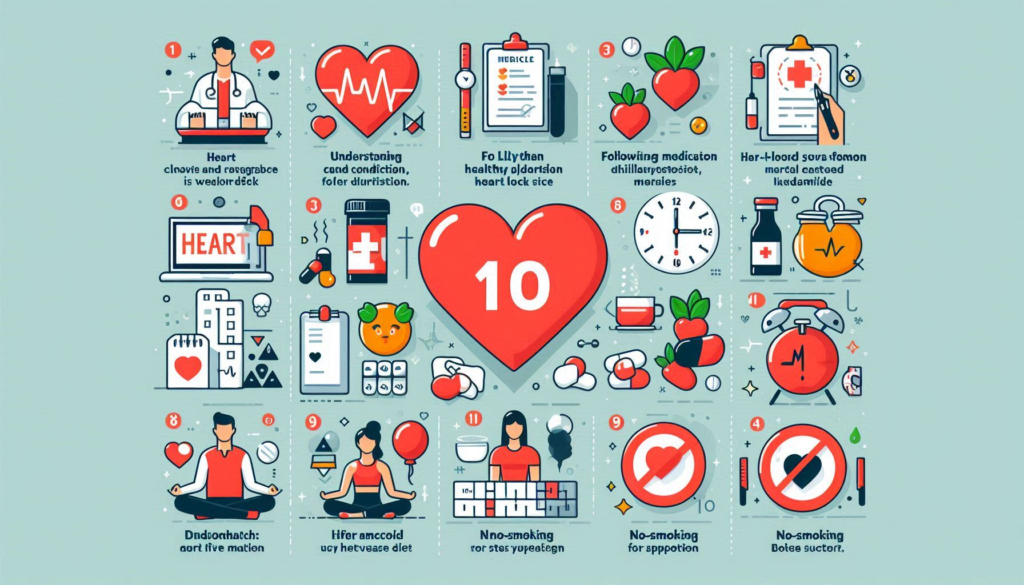
“10 Life-Saving Tips for Heart Block Patients”
Life-Saving Tips for Heart Block Patients: 10 Essential Insights
Discover 10 life-saving tips to manage heart block effectively and enhance your well-being. Essential guidance for all patients.

Introduction
Brief Overview of Heart Block and Its Impact on Health
Heart block is a condition where the electrical signals that control the heartbeat are partially or completely blocked, leading to an irregular or slow heartbeat. This can result in symptoms such as dizziness, fatigue, shortness of breath, chest pain, and fainting. Heart block can significantly impact a person’s quality of life and, if left untreated, can lead to serious complications such as heart failure or sudden cardiac arrest.
Importance of Managing Heart Block Effectively
Effective management of heart block is crucial to maintaining heart health and preventing complications. By understanding the condition, following medical advice, and making lifestyle changes, patients can improve their heart function and overall well-being. Proper management can help reduce symptoms, enhance quality of life, and increase life expectancy.
Overview of the 10 Life-Saving Tips for Heart Block Patients
In this article, we will explore ten life-saving tips for managing heart block effectively. These tips are designed to provide practical guidance and support for heart block patients, helping them lead healthier and more fulfilling lives. The tips include understanding your condition, following your doctor’s advice, taking medications as prescribed, maintaining a heart-healthy diet, staying physically active, managing stress, avoiding smoking and alcohol, monitoring symptoms, staying hydrated, and building a support system.
Tip 1: Understand Your Condition
Explanation of Heart Block and Its Types
Heart block occurs when the electrical signals that control the heartbeat are delayed or blocked as they travel through the heart. There are three main types of heart block:
- First-Degree Heart Block: The electrical signals are slowed but still reach the ventricles. This type is usually mild and may not cause noticeable symptoms.
- Second-Degree Heart Block: The electrical signals are intermittently blocked, causing some beats to be missed. This type can be further classified into two subtypes: Mobitz Type I (Wenckebach) and Mobitz Type II.
- Third-Degree (Complete) Heart Block: The electrical signals are completely blocked, preventing the atria and ventricles from communicating. This type is severe and requires immediate medical attention.
Importance of Understanding Your Specific Condition
Understanding your specific type of heart block is essential for effective management. Each type of heart block has different implications and treatment options. By knowing the details of your condition, you can make informed decisions about your care and work closely with your healthcare provider to develop a personalized treatment plan.
How to Educate Yourself About Heart Block
- Consult Your Doctor: Ask your healthcare provider to explain your condition, its causes, and the recommended treatment options. Don’t hesitate to ask questions and seek clarification.
- Read Reliable Sources: Educate yourself by reading information from reputable sources such as medical websites, books, and articles. Look for information from organizations like the American Heart Association or the Mayo Clinic.
- Join Support Groups: Connect with other heart block patients through support groups or online communities. Sharing experiences and knowledge can provide valuable insights and emotional support.
- Stay Informed: Keep up-to-date with the latest research and advancements in heart block treatment. Attend workshops, seminars, or webinars on heart health to expand your knowledge.

Tip 2: Follow Your Doctor’s Advice
Importance of Adhering to Medical Advice and Treatment Plans
Adhering to your doctor’s advice and treatment plans is crucial for managing heart block effectively. Your healthcare provider has the expertise to recommend the best course of action based on your specific condition. Following their guidance can help prevent complications, reduce symptoms, and improve your overall heart health. Ignoring medical advice or deviating from your treatment plan can lead to serious health risks and worsen your condition.
Regular Check-Ups and Monitoring
Regular check-ups and monitoring are essential for managing heart block. These appointments allow your doctor to assess your heart health, track your progress, and make necessary adjustments to your treatment plan. Routine monitoring can help detect any changes or complications early, ensuring timely intervention and better outcomes. Make sure to attend all scheduled appointments and follow your doctor’s recommendations for tests and screenings.
Communicating Effectively with Your Healthcare Provider
Effective communication with your healthcare provider is key to managing heart block. Be open and honest about your symptoms, concerns, and any challenges you face with your treatment plan. Ask questions and seek clarification if you don’t understand something. Keeping a journal of your symptoms and any side effects from medications can help provide valuable information to your doctor. Building a strong, collaborative relationship with your healthcare provider can lead to better care and improved health outcomes.
Tip 3: Take Medications as Prescribed
Role of Medications in Managing Heart Block
Medications play a vital role in managing heart block by helping to regulate heart rate, improve blood flow, and reduce symptoms. Depending on the type and severity of your heart block, your doctor may prescribe medications to control your heart rhythm, lower blood pressure, or prevent blood clots. Taking your medications as prescribed is essential for maintaining heart health and preventing complications.
Common Medications for Heart Block and Their Functions
- Beta-Blockers: These medications help slow down the heart rate and reduce the workload on the heart. They are commonly prescribed for patients with heart block to manage symptoms and improve heart function.
- Calcium Channel Blockers: These drugs help relax the blood vessels and improve blood flow, making it easier for the heart to pump blood. They can also help control heart rate.
- Antiarrhythmics: These medications help regulate the heart’s electrical activity and prevent abnormal heart rhythms.
- Anticoagulants: Also known as blood thinners, these medications help prevent blood clots, which can reduce the risk of stroke and other complications.
Tips for Remembering to Take Your Medicines
- Set Reminders: Use smartphone alarms or medication reminder apps to alert you when it’s time to take your medications.
- Create a Routine: Take your medications at the same time each day to establish a consistent routine.
- Use a Pill Organizer: A pill organizer can help you keep track of your medications and ensure you take the correct doses.
- Keep Medications Visible: Place your medications in a visible location, such as on your bedside table or kitchen counter, to remind you to take them.
- Track Your Medications: Keep a medication log or journal to track when you take your medications and any side effects you experience.
- Ask for Support: Enlist the help of a family member or friend to remind you to take your medications and provide support.

Tip 4: Maintain a Heart-Healthy Diet
Importance of a Balanced Diet for Heart Health
A balanced diet is crucial for maintaining heart health, especially for individuals with heart block. Proper nutrition helps manage blood pressure, cholesterol levels, and body weight, all of which are essential for reducing the risk of further heart complications. A heart-healthy diet provides the necessary nutrients to support overall cardiovascular function and improve your quality of life.
Foods to Include and Avoid in Your Diet
- Foods to Include:
- Fruits and vegetables: rich in vitamins, minerals, and antioxidants, they help reduce inflammation and support heart health. Aim for a variety of colors and types.
- Whole Grains: Foods like oats, brown rice, and whole wheat bread are high in fiber, which can help lower cholesterol levels.
- Lean Proteins: Include sources such as fish, poultry, beans, and legumes. Fish, especially fatty fish like salmon and mackerel, are high in omega-3 fatty acids, which are beneficial for heart health.
- Healthy Fats: Opt for unsaturated fats found in avocados, nuts, seeds, and olive oil. These fats can help reduce bad cholesterol levels.
- Low-Fat Dairy: Choose low-fat or fat-free dairy products to reduce saturated fat intake.
- Foods to Avoid:
- Processed Foods: High in sodium, unhealthy fats, and added sugars, processed foods can increase the risk of heart disease.
- Sugary Beverages: Drinks like soda and sweetened juices can contribute to weight gain and increased blood sugar levels.
- Red and Processed Meats: These can be high in saturated fats and sodium, which are detrimental to heart health.
- Trans Fats: Found in many fried and baked goods, trans fats can raise bad cholesterol levels and lower good cholesterol levels.
- Excessive Salt: High sodium intake can lead to high blood pressure, which is a risk factor for heart disease.
Sample Meal Plan for Heart Block Patients
- Breakfast:
- Oatmeal topped with fresh berries and a sprinkle of chia seeds.
- A glass of low-fat milk or a cup of green tea.
- Mid-Morning Snack:
- A handful of almonds or walnuts.
- An apple or a banana.
- Lunch:
- Grilled chicken salad with mixed greens, cherry tomatoes, cucumbers, and a vinaigrette dressing.
- A slice of whole-grain bread.
- Afternoon Snack:
- Carrot sticks with hummus.
- A small serving of low-fat yogurt.
- Dinner:
- Baked salmon with quinoa and steamed broccoli.
- A side of mixed vegetables.
- Evening Snack:
- A small bowl of mixed berries.
- A cup of herbal tea.
Tip 5: Stay Physically Active
Benefits of Regular Exercise for Heart Health
Regular exercise is essential for maintaining heart health and managing heart block. Physical activity helps improve cardiovascular fitness, strengthen the heart muscle, and enhance blood circulation. Exercise can also help manage weight, reduce blood pressure, and lower cholesterol levels, all of which are important for heart health. Additionally, regular physical activity can improve mood and reduce stress, contributing to overall well-being.
Recommended Exercises for Heart Block Patients
- Walking is a low-impact exercise that can be easily incorporated into your daily routine. Aim for at least 30 minutes of brisk walking most days of the week.
- Swimming provides a full-body workout that is gentle on the joints and helps improve cardiovascular fitness.
- Cycling: Whether on a stationary bike or outdoors, cycling is an excellent way to boost heart health and improve endurance.
- Yoga: helps improve flexibility, strength, and relaxation. Certain yoga poses can also enhance cardiovascular function.
- Strength Training: Light to moderate strength training exercises can help build muscle and improve overall fitness. Use resistance bands or light weights for a safe workout.
Tips for Staying Active Safely
- Consult Your Doctor: Before starting any new exercise routine, consult your healthcare provider to ensure it is safe for your specific condition.
- Start Slowly: Begin with low-intensity exercises and gradually increase the duration and intensity as your fitness improves.
- Listen to Your Body: Pay attention to how your body feels during and after exercise. If you experience any discomfort, dizziness, or shortness of breath, stop exercising and seek medical advice.
- Stay Hydrated: Drink plenty of water before, during, and after exercise to stay hydrated.
- Warm-Up and Cool Down: Always start with a warm-up to prepare your body for exercise and finish with a cool-down to help your muscles recover.
- Wear Appropriate Gear: Choose comfortable clothing and supportive footwear to prevent injuries and enhance your workout experience.
Read also: Unlock Heart Health Secrets: Surprising Tips for Life

Tip 6: Manage Stress Effectively
Impact of Stress on Heart Health
Stress can have a significant impact on heart health. When you’re stressed, your body releases stress hormones like cortisol and adrenaline, which can increase heart rate and blood pressure. Chronic stress can lead to inflammation, contribute to the buildup of plaque in the arteries, and increase the risk of heart disease. Managing stress effectively is crucial for maintaining a healthy heart and preventing complications related to heart block.
Stress Management Techniques
- Meditation: Practicing mindfulness meditation can help calm the mind, reduce stress, and improve overall well-being. Aim for at least 10-15 minutes of meditation daily.
- Yoga: Yoga combines physical movement with breath control and meditation, making it an effective way to reduce stress and improve flexibility and strength.
- Deep Breathing: Deep breathing exercises, such as diaphragmatic breathing and pursed-lip breathing, can help activate the body’s relaxation response and reduce stress.
- Progressive Muscle Relaxation: This technique involves tensing and then relaxing different muscle groups to promote relaxation and reduce stress.
- Mindfulness Practices: Engage in activities that promote mindfulness, such as journaling, coloring, or spending time in nature.
Tips for Incorporating Stress Relief into Your Daily Routine
- Set aside time for relaxation: Schedule regular breaks throughout the day to relax and unwind. Even a few minutes of deep breathing or stretching can make a difference.
- Create a Relaxing Environment: Designate a quiet space in your home for relaxation and mindfulness practices. Use calming scents, soft lighting, and comfortable seating.
- Stay Active: Regular physical activity can help reduce stress and improve mood. Find activities you enjoy, such as walking, dancing, or gardening.
- Connect with Others: Spend time with friends and family, and seek support from loved ones. Social connections can provide emotional support and reduce stress.
- Practice gratitude: Keep a gratitude journal and write down things you’re thankful for each day. Focusing on positive aspects of your life can help reduce stress and improve overall well-being.
Tip 7: Avoid Smoking and Alcohol
Harmful Effects of Smoking and Alcohol on Heart Health
Smoking and excessive alcohol consumption can have detrimental effects on heart health. Smoking damages the blood vessels, increases blood pressure, and reduces oxygen levels in the blood, all of which can worsen heart block and increase the risk of heart disease. Alcohol, when consumed in excess, can raise blood pressure, contribute to weight gain, and lead to irregular heart rhythms. Avoiding smoking and limiting alcohol intake are essential steps for maintaining a healthy heart.
Tips for Quitting Smoking and Reducing Alcohol Consumption
- Seek Support: Reach out to healthcare professionals, support groups, or smoking cessation programs for guidance and encouragement.
- Use Smoking Cessation Aids: Consider using nicotine replacement therapy (NRT) products, such as patches, gum, or lozenges, to help manage withdrawal symptoms.
- Identify Triggers: Recognize situations or activities that trigger the urge to smoke or drink and develop strategies to avoid or cope with them.
- Set realistic goals: Set achievable goals for reducing alcohol consumption, such as limiting the number of drinks per week or avoiding alcohol on certain days.
- Find Alternatives: Replace smoking or drinking with healthier activities, such as exercising, reading, or spending time with loved ones.
- Stay Active: Engage in physical activities and hobbies to distract yourself from cravings and reduce stress.
- Celebrate Milestones: Reward yourself for reaching milestones in your journey to quit smoking or reduce alcohol consumption, and stay motivated by tracking your progress.
Resources for Support and Assistance
- Healthcare Providers: Consult your doctor for personalized advice and support in quitting smoking and reducing alcohol consumption.
- Support Groups: Join support groups or online communities where you can share experiences and receive encouragement from others facing similar challenges.
- Hotlines and Helplines: Utilize hotlines and helplines that offer support and resources for quitting smoking and reducing alcohol intake.
- Educational Materials: Access educational materials and resources from reputable organizations, such as the American Heart Association or the Centers for Disease Control and Prevention (CDC), to learn more about the harmful effects of smoking and alcohol and how to quit.

Tip 8: Monitor Your Symptoms
Importance of Tracking Symptoms and Recognizing Warning Signs
Monitoring your symptoms and recognizing warning signs are crucial for managing heart block effectively. Keeping track of your symptoms can help you and your healthcare provider identify patterns, assess the effectiveness of your treatment plan, and make necessary adjustments. Early detection of warning signs can prevent complications and ensure timely medical intervention.
Tools and Methods for Monitoring Your Heart Health
- Symptom Journal: Keep a daily journal to record your symptoms, including their frequency, duration, and intensity. Note any triggers or activities that may have influenced your symptoms.
- Heart Rate Monitor: Use a heart rate monitor or a smartwatch with heart rate tracking capabilities to monitor your heart rate throughout the day. This can help you detect any irregularities or changes in your heart rate.
- Blood Pressure Monitor: Regularly check your blood pressure using a home blood pressure monitor. High or low blood pressure can indicate potential issues with your heart health.
- Mobile Apps: Utilize mobile apps designed for heart health monitoring. These apps can help you track your symptoms, medications, and vital signs and provide reminders for check-ups and medication intake.
- Regular Check-Ups: Schedule regular check-ups with your healthcare provider to monitor your heart health and discuss any changes or concerns.
When to Seek Medical Attention
- Severe Symptoms: Seek immediate medical attention if you experience severe symptoms such as chest pain, shortness of breath, fainting, or sudden dizziness.
- New or Worsening Symptoms: Contact your healthcare provider if you notice new symptoms or if your existing symptoms worsen.
- Irregular Heart Rate: If you detect an irregular heart rate or significant changes in your heart rate, seek medical advice.
- High or Low Blood Pressure: If your blood pressure readings are consistently high or low, consult your healthcare provider for further evaluation.
Tip 9: Stay Hydrated
Role of Hydration in Maintaining Heart Health
Staying hydrated is essential for maintaining heart health. Proper hydration helps regulate blood volume, which is crucial for maintaining healthy blood pressure and ensuring that your heart can pump blood effectively. Dehydration can lead to thickened blood, making it harder for the heart to circulate blood and increasing the risk of heart-related complications.
Tips for Staying Hydrated Throughout the Day
- Carry a Water Bottle: Keep a reusable water bottle with you at all times to remind yourself to drink water regularly.
- Set Reminders: Use smartphone alarms or hydration apps to remind you to drink water throughout the day.
- Infuse Your Water: Add slices of fruits, vegetables, or herbs to your water for a refreshing and flavorful twist.
- Monitor Your Intake: Aim to drink at least 8 glasses of water a day, but adjust based on your activity level and climate.
- Eat Hydrating Foods: Include water-rich foods in your diet, such as cucumbers, watermelon, and oranges.
- Start and End Your Day with Water: Drink a glass of water first thing in the morning and before going to bed to stay hydrated.
Importance of Avoiding Excessive Caffeine and Sugary Drinks
- Limit Caffeine: Excessive caffeine intake can lead to dehydration and increase heart rate and blood pressure. Limit your consumption of caffeinated beverages such as coffee, tea, and energy drinks.
- Avoid Sugary Drinks: Sugary drinks, such as soda and sweetened juices, can contribute to weight gain and increase the risk of heart disease. Opt for water, herbal teas, or unsweetened beverages instead.
- Choose Healthy Alternatives: Replace sugary and caffeinated drinks with healthier options like infused water, coconut water, or herbal teas to stay hydrated and support heart health.
Read also: 10 Effective Remedies for Indigestion Relief
Tip 10: Build a Support System
Importance of Having a Support Network for Motivation and Accountability
Having a support network is crucial for maintaining motivation and accountability when managing heart block. A strong support system can provide emotional encouragement, practical advice, and a sense of community. Whether it’s family, friends, or support groups, having people who understand your condition and can offer support can make a significant difference in your journey to better heart health.
Tips for Building and Maintaining a Supportive Network
- Communicate Openly: Share your condition and needs with family and friends. Open communication helps them understand how they can support you.
- Join Support Groups: Look for local or online support groups for heart block patients. These groups provide a platform to share experiences, gain insights, and receive encouragement from others facing similar challenges.
- Stay Connected: Regularly check in with your support network. Whether it’s through phone calls, video chats, or in-person meetings, staying connected helps maintain strong relationships.
- Seek Professional Help: Consider working with a counselor or therapist who can provide emotional support and coping strategies.
- Participate in Community Activities: Engage in community activities or volunteer work to build new connections and stay socially active.
- Encourage Mutual Support: Offer support to others in your network. Mutual support can strengthen relationships and create a positive, encouraging environment.
Resources for Finding Support Groups and Communities
- Healthcare Providers: Ask your doctor or healthcare provider for recommendations on local support groups or resources.
- Online Communities: Join online forums or social media groups dedicated to heart block patients. Websites like the American Heart Association and Mayo Clinic often have community sections.
- Local Organizations: Look for local heart health organizations or non-profits that offer support groups and resources.
- Hospitals and Clinics: Many hospitals and clinics offer support groups for patients with heart conditions. Check with your local healthcare facilities for available programs.
Conclusion
Recap of the 10 Life-Saving Tips for Heart Block Patients
- Understand Your Condition: Educate yourself about heart block and its types to make informed decisions about your care.
- Follow Your Doctor’s Advice: Adhere to medical advice and treatment plans to manage heart block effectively.
- Take Medications as Prescribed: Ensure you take your medications as directed to maintain heart health.
- Maintain a Heart-Healthy Diet: Follow a balanced diet to support cardiovascular function and overall well-being.
- Stay physically active: Engage in regular exercise to improve heart health and reduce symptoms.
- Manage Stress Effectively: Incorporate stress management techniques into your daily routine to protect your heart.
- Avoid Smoking and Alcohol: Quit smoking and limit alcohol consumption to reduce the risk of heart complications.
- Monitor Your Symptoms: Track your symptoms and recognize warning signs to ensure timely medical intervention.
- Stay Hydrated: Drink plenty of water to support heart function and overall health.
- Build a Support System: Create a network of supportive individuals to provide motivation and accountability.
Encouragement to Implement These Tips for Long-Term Heart Health
By implementing these ten life-saving tips, you can take proactive steps to manage heart block and improve your overall heart health. Each tip plays a vital role in supporting your cardiovascular system and enhancing your quality of life. Remember, consistency and dedication are key to achieving long-term success. Embrace these tips as part of your daily routine and enjoy the benefits of a healthier heart.
Final Thoughts on the Importance of a Healthy Lifestyle for Managing Heart Block
A healthy lifestyle is the foundation for managing heart block and maintaining overall well-being. By staying informed, following medical advice, and making positive lifestyle changes, you can effectively manage your condition and reduce the risk of complications. Prioritize your heart health, stay motivated, and seek support from your network. Your commitment to a healthy lifestyle will lead to a stronger, healthier heart and a more fulfilling life.
FAQs
- What is heart block? Heart block is a condition where the electrical signals that control the heartbeat are partially or completely blocked, leading to an irregular or slow heartbeat.
- What are the symptoms of heart block? Symptoms may include dizziness, fatigue, shortness of breath, chest pain, and fainting.
- How is heart block diagnosed? Heart block is diagnosed through tests such as electrocardiograms (ECG), Holter monitors, and stress tests.
- Can heart block be treated? Yes, treatment options include medications, lifestyle changes, and, in some cases, pacemaker implantation.
- What lifestyle changes can help manage heart block? Lifestyle changes include maintaining a hearty diet, staying physically active, managing stress, avoiding smoking and alcohol, and staying hydrated.
- How often should I see my doctor if I have heart block? Regular check-ups are essential. Your doctor will advise you on the frequency based on your specific condition.
- Can heart block be prevented? While some causes of heart block cannot be prevented, maintaining a healthy lifestyle can reduce the risk of developing heart-related issues.
- What should I do if I experience symptoms of heart block? If you experience symptoms such as dizziness, chest pain, or fainting, seek medical attention immediately.
- Are there any support groups for heart block patients? Yes, there are support groups and communities that offer support and resources for heart block patients.
- Can I lead a normal life with heart block? With proper management and lifestyle changes, many people with heart block can lead a normal and active life.
Each tip plays a vital role in supporting your cardiovascular system and enhancing your quality of life. Remember, consistency and dedication are key to achieving long-term success. Embrace these tips as part of your daily routine and enjoy the benefits of a healthier heart. A healthy lifestyle is the foundation for managing heart block and maintaining overall well-being. By staying informed, following medical advice, and making positive lifestyle changes, you can effectively manage your condition and reduce the risk of complications. Prioritize your heart health, stay motivated, and seek support from your network. Your commitment to a healthy lifestyle will lead to a stronger, healthier heart and a more fulfilling life.



One Comment
nebankovni pujcky srovnani
Přijetí hypoteční platby může být obtížné pokud nemáte rádi čekání v dlouhých
řadách , vyplnění vážný formuláře , a odmítnutí
úvěru na základě vašeho úvěrového skóre . Přijímání hypoteční platby může být problematické,
pokud nemáte rádi čekání v dlouhých řadách , podávání extrémních formulářů , a
odmítnutí úvěru na základě vašeho úvěrového skóre .
Přijímání hypoteční platby může být problematické
, pokud nemáte rádi čekání v dlouhých řadách ,
vyplnění extrémních formulářů a odmítnutí
úvěrových rozhodnutí založených na úvěrových skóre .
Nyní můžete svou hypotéku zaplatit rychle
a efektivně v České republice. https://groups.google.com/g/sheasjkdcdjksaksda/c/8mN-KCij5rI